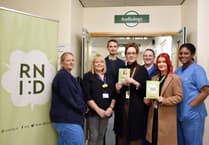THE League of Friends of Musgrove Park Hospital in Taunton has given a grant of close to £90,000 to improve and expand eye treatments at the hospital.
The League has approved the purchase of two new state of the art slit lamp cameras, which are used to get a clear view of any potential eye damage or disease.
The Musgrove’s ophthalmology service sees around over 750 patients each week and all these patients require a slit lamp examination.
A slit lamp exam is a test that lets an eye care specialist see every part of your eyes — including inside them. It's a common part of a routine eye exam.
On Tuesday, April 8, Helen Evans, senior operational manager for ophthalmology at the hospital, said the grant would enable the unit to clear a backlog of cases that has built up since COVID, and also future proof the service.
She said: “We were elated on the opportunity of delivering our presentation to the panel, and the generosity of the League of Friends and their continued support to the ophthalmology service.
“I can’t thank the League enough as they gave us the opportunity to present to them on what we wanted to spend the money on, and it was fantastic to show them how a slit lamp camera works in practice.
“The League has always supported us, and this is another example of how they’ve helped us to provide the best possible ophthalmology care at Musgrove.”
Clinton Rogers, President of the League of Friends, said: “They put forward a strong case and it is clear this donation will help a lot of patients moving forward.
“Our role is to improve services at the hospital and give money for state-of-the-art equipment which perhaps the Hospital Trust might not be able to buy.
“We could not do any of this without the amazingly generous support of the public, which we are always so grateful for.”
Helen Evans added: “Every patient that comes through an eye clinic will have tests or scans using a slit lamp, as it helps our colleagues to look at the patient’s eyes in greater depth.
“With a camera on top of the slit lamp, we’re now able to record those images, so if we need to refer a patient to another hospital for more specialised treatment, we have those vital images that we can send on with them.
“Slit lamps have evolved over the years, as ophthalmology has advanced in technology, and it’s now very much about the images we’re able to produce, so this development is so important to us.
“It’s a great training tool as well, as the camera gets down to the nitty gritty of every single ophthalmic face-to-face test or scan, which is so useful for colleagues to learn from.
“In our ophthalmology department we’re always looking to see what we can do better and smarter, and that’s something we need to continue as the demand for eye care is ever increasing.”




